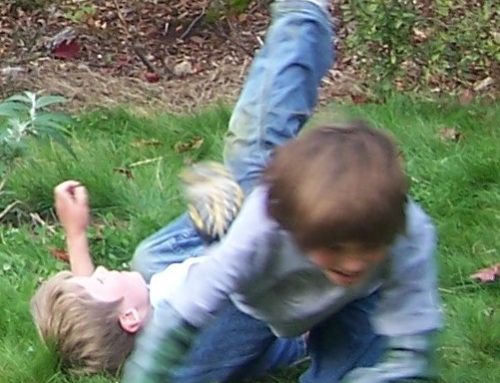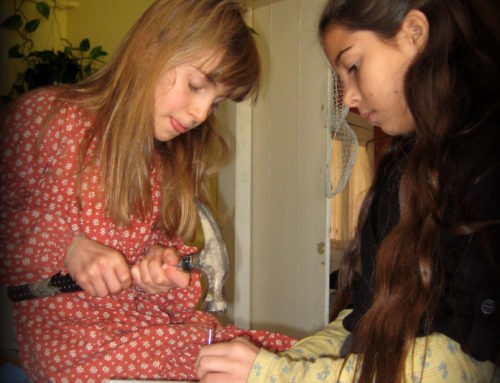Social Structure
Social structure constantly shapes and directs our lives. For most of us, it is not something that we pay much attention to or that we are consciously aware of. The following experience and insight from living on a family homestead and community with kids and parents living and working in the same space together, helped me to see how social structure might be an important element in design and of increasing kids’ autonomy:
My experience of Sidney’s family is of a little bit of chaos and lack of structure and predictability. I wonder if a little more rhythm to the day would help so he could know what to expect and when he is going to get the attention he wants. This could also help the parents get things done because they’d have a clear distinction between time that is expressly for kids and time when work is getting done. I think, if I were a kid, I’d really benefit from some rhythm and predictability. Creating some sort of structure or predictability can give kids greater command of their lives and with this structure help them to feel safe to gain greater autonomy, independence and self-determination. Predictability provides a certain level of trust and confidence to explore or take risks that might not be there otherwise. It also gives power to the kid of knowing what to expect or how things are unfolding. If the parent has an idea of how the day is to go but does not relay this to the kid, it becomes knowledge and power held exclusively by the parent.
Kids and the Six Human Needs
As I began to see the value of structure and predictability in kids ability to navigate their lives, I was reminded of six human needs, of which I learned in the context of designing workshops and working with groups. Certainty, which could also be seen as predictability, was at the top of the list and I wondered how the other five might also apply to the lives and needs of children. Anthony Robbins, visionary life coach, motivational speaker and personal empowerment trainer, outlined the following six human needs: Certainty, Variety, Connection/Love, Significance, Growth and Contribution. I have taken what I learned about these needs and explored how they might be specifically relevant to the lives of children.
Certainty/Predictability: The need to be able to rely on a situation and to feel certain that basic needs are going to be met. Also, predictability: knowing what in a general sense to expect from moment to moment. This seems especially true for kids as so much more of the world and life is new and uncertain and they are trying to make some sense of it all. When you haven’t had a lot of life experience, there is a lot less reliability to the world. When someone else is making a lot of decisions in your life for you, it can be really helpful and reassuring to know what to expect.
Variety: If things are too certain and predictable and you know what to expect all of the time, then they become boring. There’s excitement in, from time to time, having little surprises or breaking with a predictable routine. It can be totally delicious to drop other plans on a hot day just to go swimming. Within the context of rhythm and structure, most kids love a little surprise or adventure from time to time.
Connection: This is an important human experience the lack of which leads to isolation and alienation. Everyone wants to feel a sense of belonging, that there is connection to others. For kids (at least young ones) this need may be stronger since they are more dependant on others to meet their needs and to care for them. In many instances connection for kids who have not developed the capacity to meet their own needs, is a matter of survival and even perceived lack of connection can feel life-threatening.
Significance: Without some level of significance it can feel like “I don’t matter, my needs don’t matter, my self and individuality is unimportant.” Everyone wants to know that their unique being, who they are, has some importance and relevance to others. I can see how this would especially be true for kids just finding their place in the world. It’s also a sense of having power, of one’s presence having an effect on the world around them.
Growth: Growth happens at that fine edge of risk taking which most kids are seeking a lot of the time… especially when they feel secure and comfortable in their surroundings. Without growth life would become stagnant, and dull. But without a solid foundation, a measure of confidence and certainty in the world around you, just living is risky. Certainty provides a solid place from which to take greater risks and to grow.
Contribution: It’s about having a place in the web of life. Being integral to the larger design of community or group. Contribution also builds experiences of both significance (being able to offer something unique) and connection (appreciation from others and ability to affect other’s lives). Do we allow for children to make real contributions…?
In exploring these human needs, I’m really seeing how certainty and predictability are foundations on which autonomy, self-trust and self-determination are built. I can see what an important role they play in human experience, not just with kids but with people in general. Once we know what to expect in a new situation or once we become familiar with a new place, it gives us a sense of safety and security where we can move on to other things besides just understanding how things work. I think it’s an especially important element of power and control for kids. If they can know the ropes, so to speak, if they can count on their surroundings and know what to expect, that is a foundation for autonomy on which they can build.


Leave A Comment